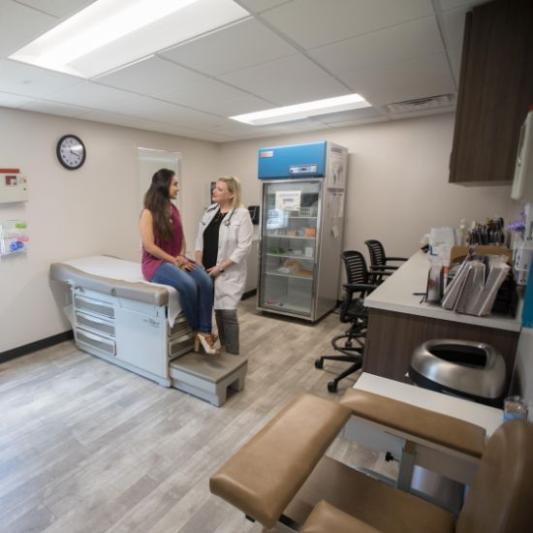Lipscomb is committed to maintaining a safe and nondiscriminatory environment for all students, faculty and staff on campus.
As stated in Titles VII and IX in the Civil Rights Act of 1964, it is illegal to discriminate on the basis of sex in educational programs and sports activities. But more than that, these violations also go against all that we believe as a Christ-centered community. The Title IX office seeks to enforce the core values of our community by serving others impartially, respecting each person we interact with, expanding our knowledge and delivering our best.
Our job and commitment in the Title IX Office is to prevent and end all forms of sexual misconduct and discrimination including but not limited to sexual harassment, sexual assault, intimate partner violence and stalking. The Title IX Office implements policies and programs to prevent sexual misconduct and discrimination, providing education and training to the campus community and staying in line with all applicable state and federal laws.
The Title IX Office does much more than sexual misconduct prevention and formal grievance processes, although that is a major part of our work. We are here to listen to you, walk with you and offer resources and support if you are faced with an issue of sexual misconduct or discrimination.
Contact us if:
- You are seeking more information on your rights and the options available to resolve an incident involving sexual misconduct or discrimination.
- You need assistance filing a report of sexual misconduct or discrimination.
- You would like to notify the university of a concern that might involve Title IX issues.
- You are questioning if something you or a friend have experienced is a Title IX offense.
- You would like information on the resources available to you for support including confidential resources, supportive measures and off campus resources.
One of Lipscomb University’s core values is to Respect All. The Title IX Office actively engages in this value by developing and implementing prevention programs that promote: respecting others, inclusivity and stepping forward as an active bystander.
Active Bystander
An incident of sexual misconduct may not have occurred to you personally, but it is not unusual for a “bystander” to either witness an incident or notice behavior that points to an incident. That’s why bystander knowledge is so important. Bystanders play a significant role in the prevention of sexual and relationship violence. If you see something, say something. Do something:
- Direct: Step in and address the situation directly. Attempt to separate the parties involved. This works best if it’s a person you know. It doesn’t work well when alcohol or drugs are involved.
- Distract: Redirect the attention elsewhere. Say, "Hey, I need to talk to you,” Ask for them to help you find your keys, trip and fall – anything to interrupt the behavior.
- Recruit: Let other people around know what's going on. Step in as a group to dissolve the situation. There is strength in numbers.
- Support: Sometimes you can’t get the person out of the situation, but you can provide support and delay progress just long enough to change the course of the incident.
- Report: Encourage the person(s) affected to report, or file a report yourself as a witness. You can even do this anonymously.
Supporting a Survivor
If someone discloses to you that they have experienced an act of sexual misconduct there are ways you can support them. The first step is to listen. Allow the person to share what they feel comfortable sharing. Believe them by reassuring you hear their story and believe them. Let them know that they are not alone and offer to help connect them to resources. Allow them to make a decision on their own to report or seek help. If you have concerns about their safety or wellbeing you can reach out on their behalf to ensure they are provided the supports they need.
Amnesty
When an incident of sexual misconduct occurs, it is natural for the victim and bystanders to worry about the consequences of reporting the incident. Lipscomb grants immunity to any person(s) who make a good-faith report—or intervene to support a survivor of sexual misconduct—from being charged with violations of other institutional policies. What does this mean? Many things, but an example might be this: Statistics show that a majority of sexual misconduct assaults involve alcohol or other substances. The university supports our state’s ban on underage drinking. However, sexual misconduct is illegal regardless of substance use. Students who report such an incident will not be charged by the university with violation of the drug and alcohol policy. We take this policy seriously and will address any inconsistencies that may arise.
Privacy
Who will know and what they will know is also a natural concern in reporting an incident of sexual misconduct, as a victim or a bystander. The university is committed to protect the privacy of all individuals involved in an alleged violation of its policies, and every effort will be made to protect the privacy of all individuals involved, including bystanders, in a manner consistent with the need for thorough review of the allegations. This means that all information involved in a Title IX violation will be shared only on a need-to-know basis to the individuals involved in the review of allegations. It is also important to know that Title IX reports and allegations are protected under the Family Educational Rights and Privacy Act (FERPA). This federal law protects the privacy and rights of student’s educational records. As a result, the Title IX Office cannot communicate with parents, relatives, etc., without written permission from the student to release their information to the specified person
Locations to receive a medical legal exam:
Nashville General Hospital
1818 Albion St
Nashville, TN 37208
Vanderbilt Medical Center
1211 Medical Center Dr
Nashville, TN 37232
When an unexpected incident occurs, what you do in the minutes and hours immediately following the event is very important. One of the first decisions you will have to make is whether or not to have evidence collected. If you have been the victim of non-consensual sexual intercourse, it is strongly recommended that you visit an emergency room within 24 hours for a medical legal exam, also known as a rape kit, to preserve evidence and support your opportunity to make decisions later.
It is recommended that victims seeking a medical legal exam go to the SAFE Clinic at the Sexual Assault Center located at 101 French Landing Drive, Nashville. The exam is provided at no cost to you. During your visit to the SAFE Clinic you will also be connected to resources at the Sexual Assault Center for support and information. If you are able, call the SAFE Clinic at 615.258.5888 prior to arrival; however, walk-ins are accepted. The secured clinic is open 24/7. You can take a trusted friend or relative with you to provide additional support. Lipscomb personnel from the Office of Student Life are available to accompany you as well.
It is recommended that you receive an exam as soon as possible after an assault occurs in order for the most evidence to be collected. Try not to shower, bathe, change clothes, eat or drink anything before your exam. If you do any of these things, that’s okay—it is still possible to collect evidence. If you changed clothes already, bring the clothes you were wearing during the assault.
It is up to you if you would like to file a police report or talk to a police officer when presenting for an exam. If you do, law enforcement will be called to the clinic and you will be able to have your support person or a sexual assault advocate present during the interview to provide support and answer any questions you may have. If you do not want to talk to police at the time of your exam, your evidence will be held if you decide to file a report in the future.
Making the decision to seek medical attention after an assault or to report the assault to the police is often a difficult decision. In addition to the off-campus resources that will be provided to you when seeking an exam, Lipscomb can provide you resources and supports on campus through the University Counseling Center, the Lipscomb Family Therapy Center and the Title IX Office.







